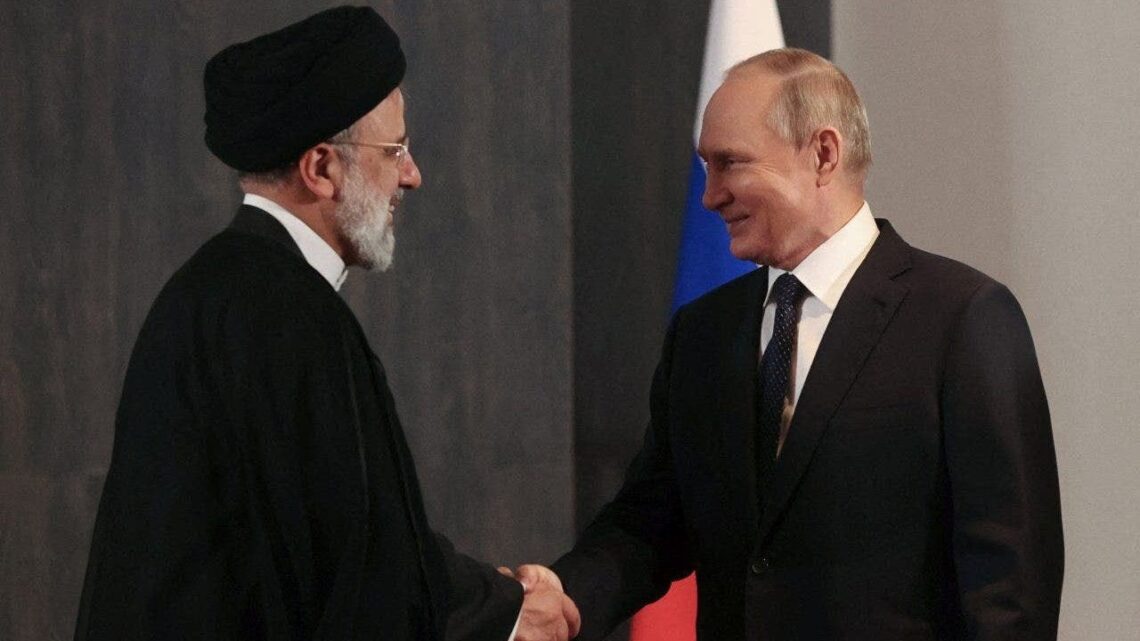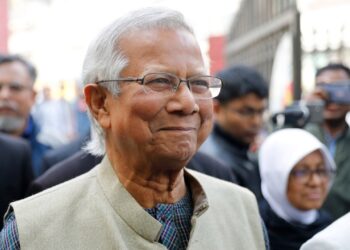The Biden administration is involved in high-stakes talks to try and persuade Niger to allow 1,000 U.S. military personnel and civilian staff to keep operating a $110 million anti-terror drone base in the West African country.
This is against a backdrop of reports that U.S. military influence is being replaced by Russia and worrying allegations that Iran is trying to buy uranium from Nigerien mines.
Already, the Reaper attack drones based at Airport 201 have not been flying missions targeting both Islamic State and al Qaeda terrorists in the region since the government of Niger was overthrown by a military coup last July.
Analysts are concerned that should the U.S. pull out of Niger, this could permit jihadist forces to surge through West Africa and lead to the further expansion of Russian influence in Africa.
RUSSIA AND US JOCKEY FOR SUPPORT ACROSS AFRICA

Supporters of Niger’s National Council of Safeguard of the Homeland hold a Russian and a Chinese flag as they gather at Place de la Concertation in Niamey on Aug. 20, 2023. (Photo by -/AFP via Getty Images)
“What we are seeing in Niger is but one of the numerous examples of the curtains closing on American influence and Western influence on the African continent,” Jasmine Opperman told Fox News Digital. Opperman, an African-based security consultant specializing in extremism, continued, “We can see this in Central Africa. We see this in Southern Africa, and with that, Russia will use each and every opportunity to expand its influence.”
The Biden administration has been made aware of this stark warning by several sources, including Marine Corps General Michael E. Langley, commander of the U.S. Africa Command. Addressing the Senate Armed Services Committee on March 7, Langley cautioned, “the Russian Federation’s narrative drowned out the U.S. governments in the past years. Russia’s destabilizing activity in Africa is to trade security assistance for access to African natural resources. Putin does this by spreading disinformation and propaganda to sow unrest, prop up sympathetic regimes, and undermine support for Western engagement on the continent.”
Langley continued, “We cannot lose sight of the continued threat al Qaeda and ISIS pose in Africa. Political instability and weak security institutions have allowed these groups to expand territorial control. We must maintain sufficient force posture and resourcing in Africa to support our national interests there.”
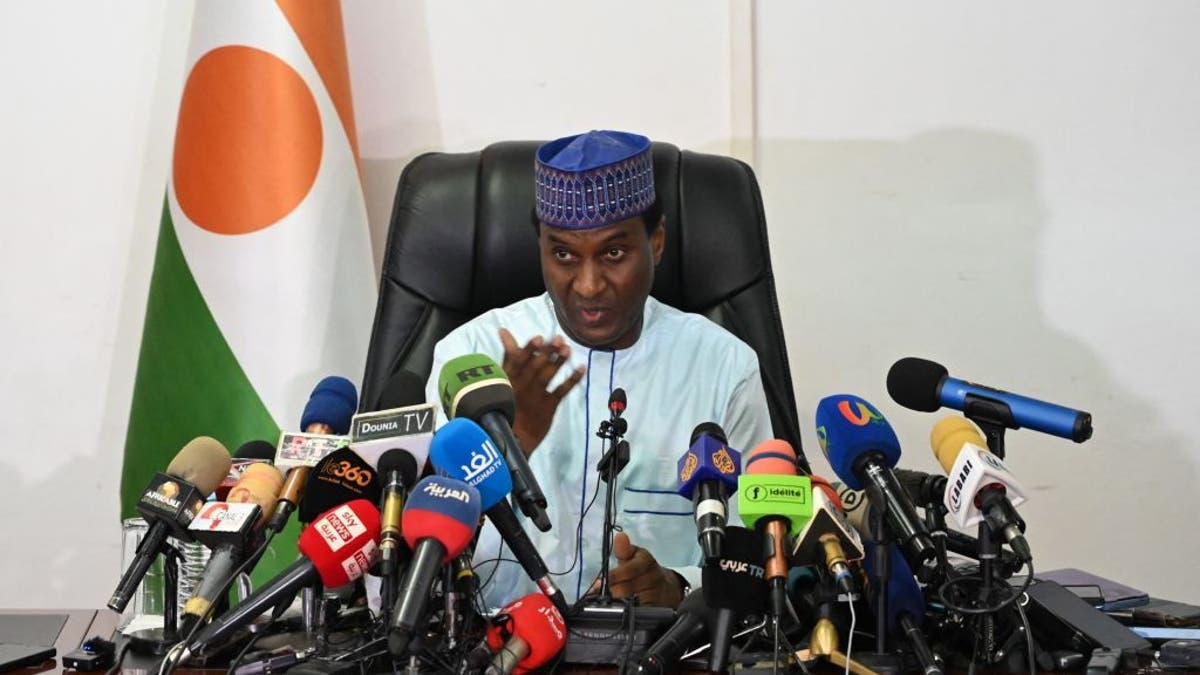
Nigerian Prime Minister Ali Mahaman Lamine Zeine speaks during a press conference in Niamey on Sept. 4, 2023. Niger’s military-appointed prime minister on Sept. 4, 2023 said he saw hopes of a deal with the West African bloc ECOWAS, which has threatened to use force to restore civilian rule after a coup in July. (Photo by -/AFP via Getty Images)
Cameron Hudson pointed out that the administration believes it has to work with a non-democratic government in Niger to keep the jihadists and Russia and Iran at bay. “The real blow is to the U.S. standing in the region,” Hudson, director of African Affairs at the National Security Council in the George W. Bush administration, told Fox News Digital. “This sends a clear message that countries have options and no longer have to entertain U.S. lectures or lobbying.”
RUSSIA ‘CHIEF BENEFICIARY’ IN DEADLY SUDAN CONFLICT AS ATTEMPTED CEASEFIRE FALLS APART
Hudson, who is now a senior associate with the Africa Program at the Center for Strategic and International Studies in Washington, added “In a bid to maintain its relevance and presence in Niger and neighboring states, Washington has shown a willingness to sacrifice its democratic values by pledging to work with these coup governments. But clearly even that was not enough”.
This weekend saw Niger, according to the Department of Defense, “announcing an end to the status of forces agreement between Niger and the United States.” Colonel Major Amadou Abdramane, the spokesperson for the military junta, the so-called National Council for the Safeguard of the Homeland, complained on local television about the U.S.’ “condescending attitude” and said that a U.S. delegation which met junta officials in Niger this past week had “the intention to deny the sovereign Nigerien people the right to choose their partners and types of partnerships capable of truly helping them fight against terrorism.”
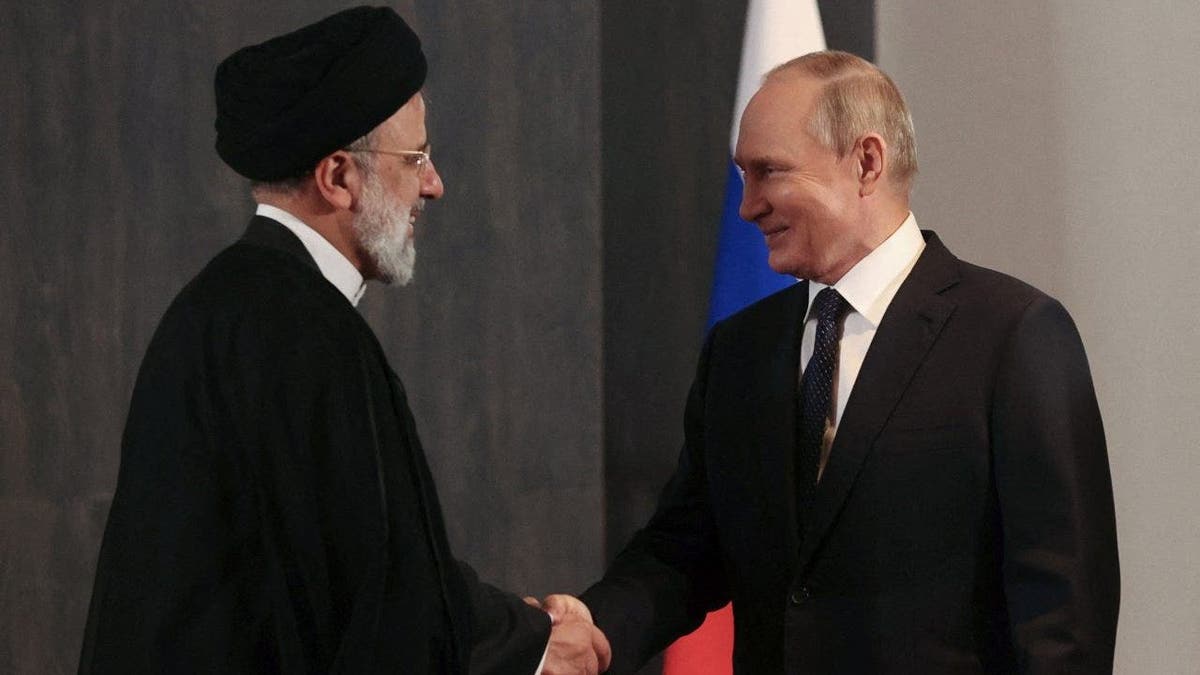
Russian President Vladimir Putin, right, shakes hands with Iranian President Ebrahim Raisi during a meeting on the sidelines of the Shanghai Cooperation Organization summit in Samarkand, Uzbekistan on Sept. 15, 2022. (Sputnik/Alexandr Demyanchuk/Pool via REUTERS)
This junta narrative was picked up by Nigerien columnist Abdoulaye Sissoko. Writing for the ActuNiger website, Sissoko stated, “There is no public evidence that American bases in Niger have proven useful.” One reader on the site commented, “Thank you for sending these white beaks away.” Another wrote, “they should pack up and go home.”
Sources say last week’s meeting with the junta was extremely difficult. The administration’s envoys did not get to meet with Niger’s principal decision maker.
“The U.S. delegation met with a CNSP (Nigerien) delegation led by the Prime Minister and several Cabinet ministers, as well as technical experts and advisors”, declared the Department of Defense’s Deputy press secretary Sabrina Singh on Monday.
BLINKEN FLIES INTO ‘SUPERPOWER’ BATTLEGROUND IN AFRICA
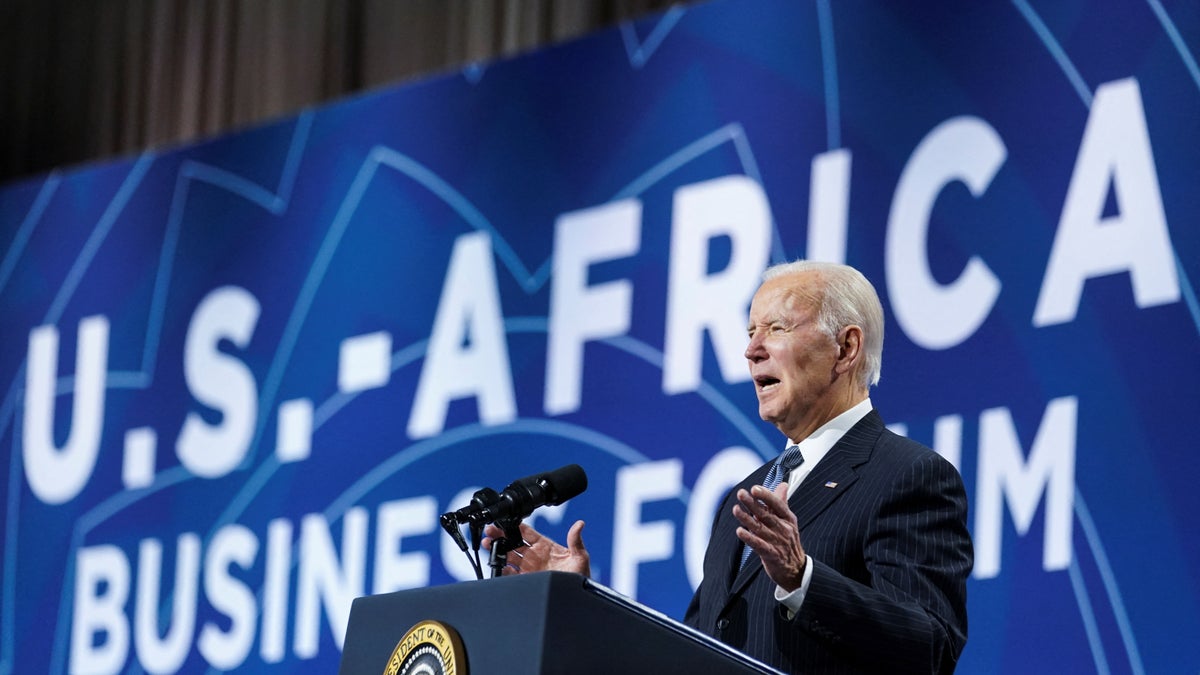
President Biden delivers keynote remarks at a U.S.-Africa Business forum at the 2022 U.S.-Africa Leaders Summit in Washington, D.C., Dec. 14, 2022. (REUTERS/Kevin Lamarque)
Pentagon officials say delegation members made their points clear. “We were troubled on the path that Niger is on, declared the DOD’s Singh. U.S. officials expressed concern over Niger’s potential relationships with Russia and Iran.”
“These were direct and frank conversations.” Analysts say that is diplomatic speak to describe a heated and charged conversation. One cynic suggested it means “they were shouting at each other”.
The State Department’s principal deputy spokesperson Vedant Patel agreed Monday the meeting was ‘frank.”
However, now the U.S. is trying to keep its troops in the country. Patel said, “We continue to engage through our embassy. We continue to have our ambassador and our embassy team there, and we’re continuing to discuss with them.”
It may be too late. Sources say that at the very least, discussions between Niger and the Kremlin to let their troops and/or mercenaries flood into the country are under way, with at least one report declaring a deal has already been signed.
Globally, potentially of more concern is that Iran is said to be negotiating to acquire uranium from Niger’s mines. Analysts say this could be used to help develop Tehran’s nuclear weapons program, and poses another threat to peace in the Middle East.

Secretary of State Antony Blinken, left, meets with former Niger President Mohamed Bazoum in Niamey, Niger on March 16, 2023. Niamey was ousted in a coup last year. (Photo by Presidency of Niger / Handout/Anadolu Agency via Getty Images)
Just this January, Nigerien Prime Minister Ali Lamine Zeine was hosted in Tehran by Iranian President Ebrahim Raisi, with the latter saying Niger has “a brilliant future”. Zeine led the negotiations with the administration’s team this past week.
However, getting open confirmation on Russia and Iran’s antics is difficult, says Hudson. “Deals with Russia and Iran in Niger remain opaque. Russia has tended to enter these countries to provide security assistance against terrorist forces and regime security for those in power. From that often follows business partnerships and investments, particularly in the mining sector.”
“It’s not clear what if any deal has been made with Iran,” added Hudson. “But we do know that Niger is anxious to diversify its mining partnerships away from France and the West and Iran sees new opportunities to break its international isolation by developing new ties to African countries.”
For the Kremlin, things are all going to plan, according to Hudson. “Russia’s interests in the region are multiple and mutually reinforcing. In Africa, Russia is breaking its international isolation, cultivating diplomatic partners to support them at the United Nations, creating new sources of revenue in challenging environments, all while displacing and undermining Western investments, interests and values.”
CLICK HERE TO GET THE FOX NEWS APP
“The Biden administration’s challenge is that it wants its cake and to eat it too. It tells African countries publicly that they are free to choose their partners and then privately the U.S. lobbies them to rethink their choices. It’s that hypocrisy that has left us out in the cold in Niger,” he said.
Security analyst Opperman told Fox News Digital she is concerned “Africa will embrace the support they are getting from Russia, Iran and China. If the U.S. and the West do not find, and quickly, a more acceptable way of influence on the African continent, I’m afraid what we’re seeing in Niger is just but the start of that curtain closing.”
(this story has not been edited by TSA Mag staff and is published from a syndicated feed.)


